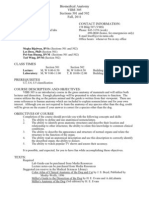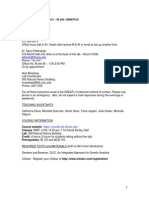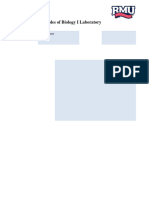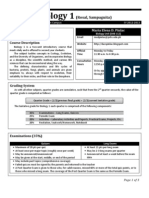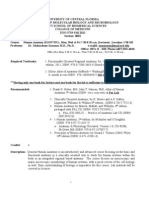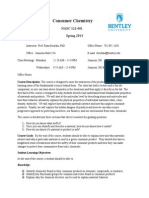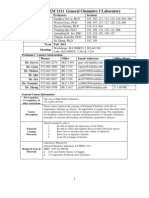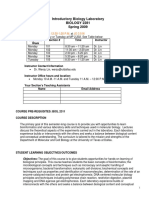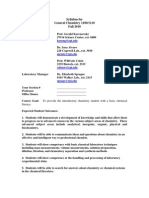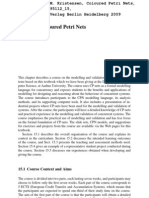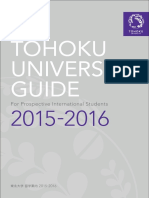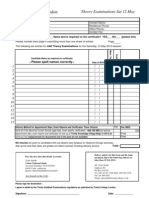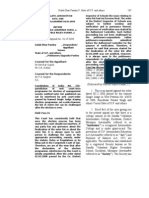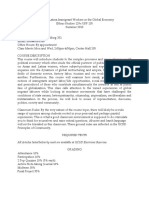0 ratings0% found this document useful (0 votes)
95 viewsAnth 110 Syllabus - 2014
Anth 110 Syllabus - 2014
Uploaded by
John Joseph CrandallThis document outlines the course objectives, requirements, materials, grading, schedule, policies, and safety procedures for an introductory biological anthropology lab. The course will cover genetics, evolution, skeletal biology, primatology, human variation and the human-primate relationship through labs, quizzes, exams, and assignments over the semester.
Copyright:
© All Rights Reserved
Available Formats
Download as DOCX, PDF, TXT or read online from Scribd
Anth 110 Syllabus - 2014
Anth 110 Syllabus - 2014
Uploaded by
John Joseph Crandall0 ratings0% found this document useful (0 votes)
95 views5 pagesThis document outlines the course objectives, requirements, materials, grading, schedule, policies, and safety procedures for an introductory biological anthropology lab. The course will cover genetics, evolution, skeletal biology, primatology, human variation and the human-primate relationship through labs, quizzes, exams, and assignments over the semester.
Original Description:
A syllabus of John Crandall's 110 lab course in biological anthropology at UNLV.
Copyright
© © All Rights Reserved
Available Formats
DOCX, PDF, TXT or read online from Scribd
Share this document
Did you find this document useful?
Is this content inappropriate?
This document outlines the course objectives, requirements, materials, grading, schedule, policies, and safety procedures for an introductory biological anthropology lab. The course will cover genetics, evolution, skeletal biology, primatology, human variation and the human-primate relationship through labs, quizzes, exams, and assignments over the semester.
Copyright:
© All Rights Reserved
Available Formats
Download as DOCX, PDF, TXT or read online from Scribd
Download as docx, pdf, or txt
0 ratings0% found this document useful (0 votes)
95 views5 pagesAnth 110 Syllabus - 2014
Anth 110 Syllabus - 2014
Uploaded by
John Joseph CrandallThis document outlines the course objectives, requirements, materials, grading, schedule, policies, and safety procedures for an introductory biological anthropology lab. The course will cover genetics, evolution, skeletal biology, primatology, human variation and the human-primate relationship through labs, quizzes, exams, and assignments over the semester.
Copyright:
© All Rights Reserved
Available Formats
Download as DOCX, PDF, TXT or read online from Scribd
Download as docx, pdf, or txt
You are on page 1of 5
ANTH 110L-1001 Introductory Biological Anthropology Lab
Wright Hall C, Room 205 Mondays, 2:30-5:20 PM
Instructor: John J. Crandall, M.A.
Office: Wright Hall A, Room 119
Office Hours: Tues 1-2pm or by appointment
(always e-mail in advance!)
Office Phone Number: (702) 895-5608
E-mail : Cranda28@unlv.nevada.edu
Course Objectives
Upon successful completion of the lab, you will have gained an understanding of the
foundational concepts of biological anthropology:
Genetics and evolutionary theory
Skeletal biology and forensic anthropology
Primatology
Human adaptation and human variation
The evolutionary relationship between humans and non-human primates
Course Requirements
Labs - You must read the entire lab procedure PRIOR to coming to class. Please bring
your lab manual, with all class handouts, to each class session. Completed labs are to be
turned in at the beginning of the next class unless the instructor states otherwise.
10 Quizzes - Quizzes will typically cover the information presented in the introductory
section of your lab manual for that days lab and the week before, unless the instructor
states otherwise. Quizzes may be pop quizzes.
3 Exams - Exams may consist of multiple choice, fill-in-the-blank, and essays based on
material covered in the lab. In addition, some portions of the exams will be hands-on and
timed. Exams are primarily non-comprehensive. Exceptions will be discussed in the
class.
Assignments - There are several Critical Thinking Questions and Pre-Labs that will be
assigned later in the semester. Instructions will be distributed via Webcampus and E-mail
to complete these.
Lab Manual Maintain an organized lab manual to document your accomplishments
throughout the course. You are responsible for keeping all graded work should a grade
contestation arise.
Required Materials
ANTH 110L Lab Manual purchased only at the UNLV Bookstore
3-ring binder
Calculator
Grading
Your final lab grade will be calculated with the following system:
Exams [3] (30%)
Pre-Labs [3] and Labs [11] (45%)
Critical Reflections [3] (15%)
Quizzes [10] (10%)
Grading Scale by Points:
A (>92.6%) B- (80-82.5%) D+ (68-69%)
A- (90-92.5%) C+ (78-80%) D (62.6-67%)
B+ (87.6-90%) C (72.6-77%) D- (60-62.5%)
B (82.5-87.5%) C- (70-72.5%) F (<60%)
COURSE SCHEDULE
Class Date LAB Due/ Comments
1-27-14
LAB 1: Biological Method and Scientific
Method (chapter 1)
2-3-14
LAB 2: Cells and DNA (chapter 2)
Inheritance (chapter 3)
Concept Review Questions Due
(at start of class)
2-10-14
LAB 3: Forces of Evolution (chapter 4)
Critical Thinking Questions for Lab 2 DUE
(short-lab writing assn. #1)
2-17-14 NO CLASS
2-20-14
EXTRA CREDI T: Anthropology Department Open House, 1-4pm in WRI-C
2-24-14
LAB 4: Modern Human Variation
(chapter 8)
3-3-14
EXAM 1: Labs 1-4
(chapters 1-4, chapter 8)
3-10-14
LAB 5: Introduction to the Skeleton
(chapter 5)
Concept Review Questions Due
(at start of class)
3-17-14 NO CLASS
3-24-14
LAB 6: Bones of the Skeleton (chapter 6)
3-31-14 LAB 7: Forensic Anthropology (chapter 7)
4-7-14 EXAM 2 : Labs 5-7 (chapters 5-7)
Critical Thinking Questions for Lab 7 DUE
(short-lab writing assn. #2)
4-14-14
LAB 8: Living Primates (chapter 10)
Primate Behavior (chapter 11)
4-21-14
LAB 9: Comparative Primate Anatomy
(Chapter 12)
Concept Review Questions Due
(at start of class)
4-28
LAB 10: Identifying the Human Lineage
(chapter 14) and The Australopithecines and
Early Members of the Genus Homo
(Chapter 15)
4-21-14
LAB 11: Later Members of the Genus
Homo (chapter 16)
5-5-14
REVIEW DAY
-or-
EXAM 3
5-12-14
EXAM 3: Labs 8-11
(chapters 10 - 12, 14 16)
Critical Thinking Questions for Lab 11 DUE
(short-lab writing assn. #3)
Reminders:
Quizzes happen at the start of each course to review material and give you a flavor of what
exam questions will look like. Late students will not be given quizzes!
Completed Labs and Pre-labs are due at the start of the class during which they are due.
This is a lab science course and so the emphasis is on content and facts. The best way to prepare for
tests and do well in the course is to keep up with your lab work and ask questions if you do not
understand.
Classroom Conduct
Please arrive to class on time and stay until lab is done. Students who are more than 5
minutes late will not be allowed to take the quiz for the day, resulting in a loss of points.
I will be introducing the lab material, giving the quiz, and take questions about the days
activities during the first 10-15 minutes of each lab session so it is important that you be
there on time to hear all announcements. Students who are more than 30 minutes late will
not be allowed to attend the lab and will be given an unexcused absence.
Assignments are due at the BEGINNING of class.
o Late Assignment Policy:
1. Homework must be turned in at the beginning of the class period for full credit.
2. Late homework may be turned in until 11:59pm on the date it is due for up to 3/4
credit.
3. After the due date, you have 24 hours to turn in the homework for up to half credit.
4. After those 24 hours have passed, you have another 24 hours to turn in the
homework for up to one fourth credit.
5. Once 48 hours have passed after the due date, you will receive an automatic zero for
the assignment.
6. NOTE: In the case of homework due on the date you have an EXCUSABLE
absence supported by documentation, the instructor will assign you a new due date.
After that date, the policy outlined above applies.
7. EXCEPTIONS: The homework that is due at the time of the Final Exam MUST be
turned in by 5:00 pm on the date of the final. No exceptions.
Attendance at all lab sessions is mandatory. If you miss a lab, you must provide a valid
excuse with proper documentation within 24 hours. If you anticipate missing a lab, you
must notify the instructor of your absence as soon as possible and provide documentation.
If excused, you may be instructed to attend another lab section. The decision to excuse
an absence and its outcome will be determined by the instructor. Your grade is highly
dependent on weekly labs (which often require extensive preparation by the instructor) so
unexcused absences will not be tolerated. Upon your 3rd unexcused absence, you will
no longer be able to receive a grade higher than an F in this course. This is a hands-
on, experiential learning-based course. Attendance is critical!
Cell phones should be OFF (this does NOT mean vibrate) once class begins and should
remain out of sight. Use of cell phones during class (talking, texting, etc) will not be
tolerated and if you are using it, you may be asked to leave the class.
Cheating is strictly prohibited and anyone suspected of cheating will be subject to
policies set forth by the university. This includes exams, quizzes, and labs. You are NOT
to have the same explanations.as your peers. You must also show and complete all of
your own calculations. Plagiarism will NOT be tolerated. All assignments must be
properly cited, if necessary, including a formal reference section. Students may be
sanctioned for academic dishonesty, up to and including a failing course grade.
At the end of the term, each student will have their lowest lab grade dropped before
grades are calculated. This may allow a student to be minimally affected by a unexcused
absence. This dropped day, however, does not detract an absence from your record in
regards to potentially failing the course should you accrue 3 unexcused absences.
Laboratory Safety Policies
No eating or drinking during lab sessions (drinks with lids may be kept in your bags)
All skeletal material is to be treated with respect and care whether it is real or a replica. These
materials are VERY expensive and some are irreplaceable.
o Tips on handling skeletal material:
1. Always handle material with BOTH hands
2. Place all material on the provided mats
3. Report anyone who mishandles materials or disrespects them. Inappropriate
conduct may result in an administrative drop from the lab.
Treat all instruments with care and respect. These are also expensive.
Do not touch any chemicals with your bare hands unless instructed as safe.
Report all accidents to the instructor immediately even minor ones. I need to know if
something breaks or if someone is injured in some way.
Academic Misconduct Academic integrity is a legitimate concern for every member of the campus
community; all share in upholding the fundamental values of honesty, trust, respect, fairness,
responsibility and professionalism. By choosing to join the UNLV community, students accept the
expectations of the Academic Misconduct Policy and are encouraged when faced with choices to always
take the ethical path. Students enrolling in UNLV assume the obligation to conduct themselves in a
manner compatible with UNLVs function as an educational institution.
An example of academic misconduct is plagiarism. Plagiarism is using the words or ideas of another, from
the Internet or any source, without proper citation of the sources. See the Student Academic Misconduct
Policy (approved December 9, 2005) located at: http://studentconduct.unlv.edu/misconduct/policy.html.
Copyright The University requires all members of the University Community to familiarize themselves
and to follow copyright and fair use requirements. You are individually and solely responsible for
violations of copyright and fair use laws. The university will neither protect nor defend you nor
assume any responsibility for employee or student violations of fair use laws. Violations of
copyright laws could subject youto federal and state civil penalties and criminal liability, as well as
disciplinary action under University policies. Additional information can be found at:
http://provost.unlv.edu/copyright/statements.html.
Disability Resource Center (DRC) The UNLV Disability Resource Center (SSC A 143,
http://drc.unlv.edu/, 702-895-0866) provides resources for students with disabilities. If you feel that you
have a disability, please make an appointment with a Disabilities Specialist at the DRC to discuss what
options may be available to you.
If you are registered with the UNLV Disability Resource Center, bring your Academic Accommodation
Plan from the DRC to me during office hours so that we may work together to develop strategies for
implementing the accommodations to meet both your needs and the requirements of the course. Any
information you provide is private and will be treated as such. To maintain the confidentiality of your
request, please do not approach me before or after class to discuss your accommodation needs.
Religious Holidays Policy Any student missing class quizzes, examinations, or any other class or lab
work because of observance of religious holidays shall be given an opportunity during that semester to
make up missed work. The make-up will apply to the religious holiday absence only. It shall be the
responsibility of the student to notify the instructor no later than the end of the first two weeks of classes,
September 6, 2013, of his or her intention to participate in religious holidays which do not fall on state
holidays or periods of class recess. This policy shall not apply in the event that administering the test or
examination at an alternate time would impose an undue hardship on the instructor or the university that
could not reasonably been avoided. For additional information, please visit:
http://catalog.unlv.edu/content.php?catoid=4&navoid=164.
Incomplete Grades The grade of I Incomplete can be granted when a student has satisfactorily
completed all course work up to the withdrawal date of that semester/session but for reason(s) beyond
the students control, and acceptable to the instructor, cannot complete the last part of the course, and
the instructor believes that the student can finish the course without repeating it. A student who receives
an I is responsible for making up whatever work was lacking at the end of the semester. If course
requirements are not completed within the time indicated, a grade of F will be recorded and the GPA will
be adjusted accordingly. Students who are fulfilling an Incomplete do not register for the course but make
individual arrangements with the instructor who assigned the I grade.
Tutoring The Academic Success Center (ASC) provides tutoring and academic assistance for all UNLV
students taking UNLV courses. Students are encouraged to stop by the ASC to learn more about
subjects offered, tutoring times and other academic resources. The ASC is located across from the
Student Services Complex (SSC). Students may learn more about tutoring services by calling (702) 895-
3177 or visiting the tutoring web site at: http://academicsuccess.unlv.edu/tutoring/.
UNLV Writing Center
One-on-one or small group assistance with writing is available free of charge to UNLV students at the
Writing Center, located in CDC-3-301. Although walk-in consultations are sometimes available, students
with appointments will receive priority assistance. Appointments may be made in person or by calling
895-3908. The students Rebel ID Card, a copy of the assignment (if possible), and two copies of any
writing to be reviewed are requested for the consultation. More information can be found at:
http://writingcenter.unlv.edu/
Rebelmail By policy, faculty and staff should e-mail students Rebelmail accounts only. Rebelmail is
UNLVs official e-mail system for students. It is one of the primary ways students receive official university
communication such as information about deadlines, major campus events, and announcements. All
UNLV students receive a Rebelmail account after they have been admitted to the university. Students e-
mail prefixes are listed on class rosters. The suffix is always @unlv.nevada.edu.
REMINDERS:
ALL DATES ON THE SYLLABUS ARE SUBJECT TO CHANGE.
YOUR CONTINUED ENROLLMENT IN THIS COURSE CONSTITUTES YOUR
AGREEMENT TO MAKE AN EFFORT IN THIS COURSE.
YOUR ENROLLMENT CONSTITUTES AN AGREEMENT TO FOLLOW THE
POLICIES OF THIS COURSE, UNLV AND THE STATE POLICIES EXPECTED
OF YOU.
ACADEMIC DISHONESTY CAN RESULT IN GRADE SANCTIONING UP TO A
FAILING GRADE IN THIS COURSE. THIS DOES NOT INCLUDE
CONSEQUENCES FROM THE STUDENT CONDUCT HEARING BOARD
THAT MAY BE INCURRED SHOULD YOU BE REPORTED FOR POSSIBLE
ACADEMIC DISHONESTY.
3 UNEXCUSED ABSENCES WILL RESULT IN A FAILING GRADE IN THIS
COURSE!
You might also like
- BLG 230 SyllabusDocument6 pagesBLG 230 Syllabusjulliee112No ratings yet
- Concrete International - The Floor Flatness ReportDocument8 pagesConcrete International - The Floor Flatness ReportVo Kien Cuong100% (1)
- Chemistry 1C Syllabus Foothill College Fall 2010Document12 pagesChemistry 1C Syllabus Foothill College Fall 2010stlawryNo ratings yet
- Anatomy Syllabus Fall 2015 Sec 0001and HonorsDocument10 pagesAnatomy Syllabus Fall 2015 Sec 0001and HonorskarijaniNo ratings yet
- Csulb: Astr 100L Astronomy LabDocument3 pagesCsulb: Astr 100L Astronomy LabJayMShizzleNo ratings yet
- ARCH 577 - Syllabus - 2021Document26 pagesARCH 577 - Syllabus - 2021Krishna McCallisterNo ratings yet
- Anatomy Lab Syllabus Fall 2015 WebCTDocument18 pagesAnatomy Lab Syllabus Fall 2015 WebCTkarijaniNo ratings yet
- Syllabus - ANT 301 - TO Biological Anthropology Fall Semester 2019Document7 pagesSyllabus - ANT 301 - TO Biological Anthropology Fall Semester 2019WeaselmonkeyNo ratings yet
- Chem108 Syllabus Spring16Document5 pagesChem108 Syllabus Spring16littlekoalaNo ratings yet
- Fall 2011 SyllabusDocument6 pagesFall 2011 SyllabusflorezstephanieNo ratings yet
- Genetics SyllabusDocument7 pagesGenetics SyllabusAngela PhamNo ratings yet
- Syllabus For Human Anatomy LabDocument20 pagesSyllabus For Human Anatomy LabapricotbubblesNo ratings yet
- Osteology Syllabus 1 PDFDocument6 pagesOsteology Syllabus 1 PDFRubén García DíazNo ratings yet
- Vertphys SyllabusDocument4 pagesVertphys Syllabusnokate konkoor100% (6)
- PCB3063L Summer 2015 SyllabusDocument10 pagesPCB3063L Summer 2015 SyllabusadmiralrevNo ratings yet
- CHM 2211L - Course SyllabusDocument5 pagesCHM 2211L - Course SyllabusHung HuynhNo ratings yet
- CHM 2045L Syllabus Spring 2017 1Document7 pagesCHM 2045L Syllabus Spring 2017 1CinzNo ratings yet
- Anhb1101 2016 Sem-1Document5 pagesAnhb1101 2016 Sem-1DoonkieNo ratings yet
- BIO111 - S - Chandrasekaran Syllabus - Fall 2021Document7 pagesBIO111 - S - Chandrasekaran Syllabus - Fall 2021Seth JonesNo ratings yet
- PHY 242 Lab - SyllabusDocument4 pagesPHY 242 Lab - SyllabusAnonymous Ms8nYcbxY2No ratings yet
- Save YouDocument5 pagesSave Youemilyholeski23No ratings yet
- CHM 2045L-Syllabus-Fall 2016-Final PDFDocument8 pagesCHM 2045L-Syllabus-Fall 2016-Final PDFCinzNo ratings yet
- Bio118 11 SyllabusDocument5 pagesBio118 11 Syllabusz0mbiem4geNo ratings yet
- Bio 180 SyllabusDocument4 pagesBio 180 SyllabusAnusha SathiNo ratings yet
- Syllabus Cell Biology (BIO 3000) : InstructorDocument7 pagesSyllabus Cell Biology (BIO 3000) : InstructorMary JewelNo ratings yet
- Principles of Organismal Biology, Evolution & Ecology: Biosci 131-2743 Diablo Valley College - Fall Semester 2019Document8 pagesPrinciples of Organismal Biology, Evolution & Ecology: Biosci 131-2743 Diablo Valley College - Fall Semester 2019foreverinparadiseNo ratings yet
- Parson Bio 101 Fall 2024 SyllabusDocument6 pagesParson Bio 101 Fall 2024 Syllabusi3samaralNo ratings yet
- Syllabus Biol110 Glover Fall20141Document6 pagesSyllabus Biol110 Glover Fall20141api-266867149No ratings yet
- Summer 17 Syllabus 1801 (3614)Document8 pagesSummer 17 Syllabus 1801 (3614)David ChindumboNo ratings yet
- 2014 F 2053 LeveningDocument3 pages2014 F 2053 Leveningapi-236729495No ratings yet
- BIO 230 Syllabus 190 Spring 2024 Angermeier - TaggedDocument9 pagesBIO 230 Syllabus 190 Spring 2024 Angermeier - Taggedkb95387No ratings yet
- Microbiology SyllabusDocument5 pagesMicrobiology SyllabusasdfasgNo ratings yet
- IB 204 SyllabusDocument7 pagesIB 204 SyllabusQuân VōNo ratings yet
- BIOL 1315 Lab Syllabus Robert Morris UniversityDocument6 pagesBIOL 1315 Lab Syllabus Robert Morris UniversityaddiekboringNo ratings yet
- Bio1 Guidelines SY2012-2013 PDFDocument3 pagesBio1 Guidelines SY2012-2013 PDFdacspinlacNo ratings yet
- Spring 10Document4 pagesSpring 10Theodore LiwonganNo ratings yet
- Anat Syllabus 0001 Fall 2011Document9 pagesAnat Syllabus 0001 Fall 2011blowme1234312341234No ratings yet
- CHEM 101 Syllabus F11v2Document8 pagesCHEM 101 Syllabus F11v2Joseph OhNo ratings yet
- Conceptual Physics (PHYS 100) Fall 2008: TH THDocument22 pagesConceptual Physics (PHYS 100) Fall 2008: TH THSajadBishopNo ratings yet
- Syllabus-Consumer Chemistry - NASC 121Document8 pagesSyllabus-Consumer Chemistry - NASC 121Zac WinklerNo ratings yet
- CHEM1020 s1 2013 Lab ManualDocument96 pagesCHEM1020 s1 2013 Lab ManualAnonymous wykmcFHwNo ratings yet
- Physics 2425 Lab SyllabusDocument7 pagesPhysics 2425 Lab Syllabusnokate konkoorNo ratings yet
- UT Dallas Syllabus For Chem1111.125.11f Taught by Amandeep Sra (Aks057000)Document10 pagesUT Dallas Syllabus For Chem1111.125.11f Taught by Amandeep Sra (Aks057000)UT Dallas Provost's Technology GroupNo ratings yet
- UT Dallas Syllabus For Biol2281.101.09s Taught by Wen Lin (Wenju)Document7 pagesUT Dallas Syllabus For Biol2281.101.09s Taught by Wen Lin (Wenju)UT Dallas Provost's Technology GroupNo ratings yet
- Theories of Crime Causation SyallbusDocument11 pagesTheories of Crime Causation SyallbusCompuesto JassonNo ratings yet
- For 286 Syllabus - Fall 2019 - v2.1Document8 pagesFor 286 Syllabus - Fall 2019 - v2.1Elizabeth RussellNo ratings yet
- BSC 114 115Document6 pagesBSC 114 115sahanchem0% (1)
- CHM 111-D2 Fall 2014 SyllabusDocument6 pagesCHM 111-D2 Fall 2014 SyllabusJaysonKempingerNo ratings yet
- Biology SyllabusDocument5 pagesBiology Syllabusapi-234068139No ratings yet
- School of Mathematics and Natural Sciences: Irina - Borovkov@utdallas - EduDocument4 pagesSchool of Mathematics and Natural Sciences: Irina - Borovkov@utdallas - EdubillyNo ratings yet
- CHEM 1111 SyllabusDocument7 pagesCHEM 1111 SyllabusheymyguywhatspoppinNo ratings yet
- Physics Syllabus2013-2014Document21 pagesPhysics Syllabus2013-2014api-224482731No ratings yet
- ME335 Lab Instructions For StudentsDocument4 pagesME335 Lab Instructions For StudentsAnonymous CMl3VnEmVFNo ratings yet
- Apes Syllabus 2015-2016Document4 pagesApes Syllabus 2015-2016api-234199339No ratings yet
- Chem SyllabusDocument5 pagesChem SyllabusMichael S. HorowitzNo ratings yet
- Chemistry Syllabus 2014-2015Document3 pagesChemistry Syllabus 2014-2015api-233878717No ratings yet
- A&P 2401 Lab SyllabusDocument6 pagesA&P 2401 Lab SyllabusCesar GarciaNo ratings yet
- BIO226L Syllabus Sp2015Document6 pagesBIO226L Syllabus Sp2015Kevin GianNo ratings yet
- Fall 2023 CHE 422 SyllabusDocument11 pagesFall 2023 CHE 422 SyllabusEthan BakerNo ratings yet
- Food Chemistry Syllabus 1179Document6 pagesFood Chemistry Syllabus 1179oforijulius77No ratings yet
- Development of Learning Strategies Within Chemical EducationFrom EverandDevelopment of Learning Strategies Within Chemical EducationNo ratings yet
- AQA Psychology A Level – Research Methods: Practice QuestionsFrom EverandAQA Psychology A Level – Research Methods: Practice QuestionsNo ratings yet
- PeDocument9 pagesPemcheche12No ratings yet
- 2281 Economics: MARK SCHEME For The October/November 2007 Question PaperDocument4 pages2281 Economics: MARK SCHEME For The October/November 2007 Question Papermstudy123456No ratings yet
- 06-Assessment in Learning1Document12 pages06-Assessment in Learning1Regie MarcosNo ratings yet
- Chapter 15Document12 pagesChapter 15Nour ElhodaNo ratings yet
- Education ActDocument136 pagesEducation ActOlaNo ratings yet
- Tohoku University Guide: For Prospective International StudentsDocument17 pagesTohoku University Guide: For Prospective International StudentsHương TrịnhNo ratings yet
- Course IntroDocument6 pagesCourse IntrosuirezNo ratings yet
- 04 Theory Entry Form 12 Spring FinalDocument2 pages04 Theory Entry Form 12 Spring FinalSamir ObaidoNo ratings yet
- DNB CET - January 2014pdfDocument152 pagesDNB CET - January 2014pdfgrobbebolNo ratings yet
- Syllabus B.Ed. - Two Year Course - 2015 2017 PDFDocument84 pagesSyllabus B.Ed. - Two Year Course - 2015 2017 PDFRahul SinghNo ratings yet
- GR 6 Term 4 2017 Maths TrackerDocument96 pagesGR 6 Term 4 2017 Maths TrackerIrfaanNo ratings yet
- Nari Wulandari - 2223170081 - 6c - Midterm EltDocument3 pagesNari Wulandari - 2223170081 - 6c - Midterm EltNari WulandariNo ratings yet
- Assessment in Learning 1 With Focus On TM I: Davao Oriental State College of Science and TechnologyDocument37 pagesAssessment in Learning 1 With Focus On TM I: Davao Oriental State College of Science and TechnologyIris PontoNo ratings yet
- NCSE2009 Eng Lang P1 TeacherDocument10 pagesNCSE2009 Eng Lang P1 Teacherget thosebooksNo ratings yet
- Traditional Teaching Strategies Versus Cooperative Teaching Strategies: Which Can Improve Achievement Scores in Chinese Middle Schools?Document10 pagesTraditional Teaching Strategies Versus Cooperative Teaching Strategies: Which Can Improve Achievement Scores in Chinese Middle Schools?إسراء الصاويNo ratings yet
- Bim II SyllabusDocument4 pagesBim II Syllabusapi-219666681No ratings yet
- Indian Law Report - Allahabad Series - Apr2009Document76 pagesIndian Law Report - Allahabad Series - Apr2009PrasadNo ratings yet
- Infosys Placement Paper Question BankDocument11 pagesInfosys Placement Paper Question BankMd Shadab AbedinNo ratings yet
- 96fcf0 Organ HandbookDocument34 pages96fcf0 Organ Handbooktom bomberNo ratings yet
- ACCT 250 - Auditing-Syed Zain Ul Abideen-Waqar AliDocument6 pagesACCT 250 - Auditing-Syed Zain Ul Abideen-Waqar AliblablaNo ratings yet
- Roles of Teacher in Classroom ManagementDocument44 pagesRoles of Teacher in Classroom ManagementAthirah Md Yunus100% (1)
- All Questions Kata English2015Document8 pagesAll Questions Kata English2015tharaka1226No ratings yet
- Practical Research 2: Quarter 2 - Module 7Document32 pagesPractical Research 2: Quarter 2 - Module 7Kenneth Aquino50% (6)
- QF - Operation & Maint of PSA Oxygen Plant - STC - NSQF-4Document15 pagesQF - Operation & Maint of PSA Oxygen Plant - STC - NSQF-4Fasika AbebayehuNo ratings yet
- MAJORSHIPDocument5 pagesMAJORSHIPRukie17 KuchikiNico100% (1)
- AWS Certified Developer Associate Exam GuideDocument8 pagesAWS Certified Developer Associate Exam GuideBhuvan DalavaiNo ratings yet
- All Articles Listed Below by Week Are Available at UCSD Electronic ReservesDocument4 pagesAll Articles Listed Below by Week Are Available at UCSD Electronic ReservesvictorvienNo ratings yet
- The Problems of Senior Three Students' Mute-Crux in English Learning in ChinaDocument6 pagesThe Problems of Senior Three Students' Mute-Crux in English Learning in ChinaMatt ChenNo ratings yet









